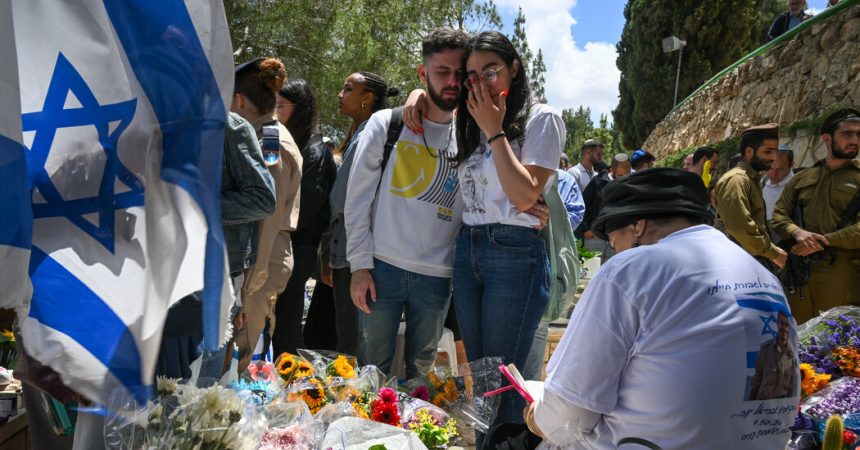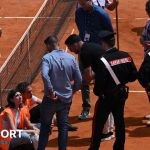Israel is observing Memorial Day, a somber annual commemoration that has taken on added significance this year in the aftermath of the Oct. 7 attack and the war it ignited.
Prime Minister Benjamin Netanyahu on Monday attended a ceremony honoring Israel’s war dead on Mount Herzl in Jerusalem, home to the national military cemetery, and delivered remarks at a commemoration for Israeli victims of terrorism.
The national day of mourning officially began at sundown on Sunday. At around 8 p.m., a minute-long siren sounded across the country, bringing pedestrians to a standstill in the streets and traffic to a halt.
Memorial ceremonies will be held through Monday afternoon in schools, hospitals and local communities. Bereaved families traditionally take the day to visit their loved ones’ graves.
Even in a normal year, the Memorial Day for fallen soldiers and victims of terrorist attacks is sacrosanct in Israel, a small country where many know someone killed or wounded as a result of Israel’s wars with its neighbors. But this year’s commemorations are taking place as the country is struggling to recover from the trauma of the Hamas-led assault on Oct. 7, the deadliest day in Israel’s history, and facing increasing international isolation brought on by the war it launched in response.
Roughly 1,200 people were killed and 250 taken hostage on Oct. 7, according to the Israeli authorities. According to the Israeli military, 272 soldiers have been killed and 1,660 wounded since Israel launched the ground invasion against Hamas in Gaza.
In a ceremony at the Western Wall plaza in Jerusalem, Lt. Gen. Herzi Halevi, the army’s chief of staff, said he bore responsibility for the army’s failures of that day. He also thanked the families of the soldiers who have died in the seven months of fighting since.
“I stand humbly before your courage to endure pain, to gather the strength each day despite heavy loss, and fill the void with meaning,” he said.
The international community’s attention is now fixed on the Israeli military’s conduct in Gaza, where more than 34,000 people have been killed, according to the local health authorities. But the gaze of many Israelis is still mostly focused inward, with the attack’s victims and those taken hostage at the center of the national conversation.
Eyal Brandeis, who is from Kibbutz Sufa near the Gaza border, said he planned on Monday to visit the graves of two friends killed in the Oct. 7 attack. His community was evacuated to Ramat Gan, a suburb of Tel Aviv, after the attack, and has yet to return home seven months later.
“This year, it’s so much closer for everyone. We lost close friends,” said Mr. Brandeis, 60. “Memorial Day is always special in Israel, but this year will be even more intense.”
For Israelis whose loved ones are still in Gaza, the day is particularly painful. Hamas and other armed groups are still holding more than 130 living and dead hostages, according to the Israeli authorities — and negotiations to secure their release have stalled.
Bar Goren’s father, Avner, 56, was killed during the Hamas-led attack on Kibbutz Nir Oz. His mother, Maya, is presumed dead, her body still among those held in Gaza.
“We don’t have our mother’s grave to visit and grieve. And for me, I can’t bear emotionally to go to my father’s tomb in Nir Oz as long as there’s an empty plot next to him, where she should be,” said Mr. Goren, 23.
On Monday evening, the Memorial Day observances will end and Israel will shift to celebrating the country’s 76th Independence Day.
But Renana Gome, who is also from Nir Oz, said she would sit out the festivities this year. Her two children, Yagil and Or, were taken hostage on Oct. 7 and held in Gaza for weeks. They were freed during a weeklong truce at the end of November, but the body of Ms. Gome’s ex-husband, Yair, is still being held by Palestinian militants in the enclave, according to the Israeli authorities.
“We cannot celebrate our independence as long as there are more than 132 living and dead hostages in captivity,” Ms. Gome said. “Leave the flag at half-mast.”
Johnatan Reiss contributed reporting.






